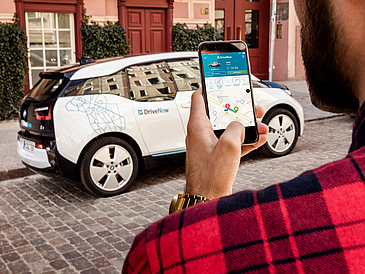Everything from traffic regulation and monitoring the weather to optimizing waste disposal and searching for places to park: various IT systems have been making our lives easier for quite a long time. In the city of tomorrow, these systems will have to work together. Now 22 partners in 10 different countries are pooling their efforts in a European project designed to pave the way for the Smart City. Participating in the research is the University of Bremen’s BIBA – the Bremen Institute for Production and Logistics.
Vision: Life in the city of tomorrow will be greener, safer, and easier
The name of the collaborative project is bIoTope (pronounced: Biotope) – “building an IoT open innovation ecosystem for connected smart objects”. Its objective is to build up an open Internet-of-Things (IoT) ecosystem that will enable the universal integration of intelligent objects. Such a system would provide enterprises with the foundations to develop new platforms for networked objects with a minimum of investment.
In a nutshell, the vision shared by participants in bloTope is to make life in the city of tomorrow greener, safer, and easier. This is also a shared European goal, and the European Commission is supporting the project in the frame of its Horizont 2020 program. Besides institutions representing research, science, and the administration in eight EU member states, there is also an Australian partner, the Commonwealth Scientific and Industrial Research Organisation (CSIRO), and a formal cooperation with the State University of Information Technologies, Mechanics and Optics (ITMO University) in Saint Petersburg. Other project partners in Germany besides BIBA are BMW, eccenca GmbH, and the Fraunhofer Institute for Intelligent Analysis and Information Systems (IAIS).
“We need a common language for the multitude of systems that already exist”
At present, the innumerous systems are largely isolated from one another. The bIoTope project is designed to connect them up and enable smart objects and systems to communicate with each other, which will in turn open up multiple new options. By creating such linkages, existing networks and systems will in future mutually enhance each other.
“Up to now, we have a multitude of so-called ‘vertical silos’, all with their own language and containing large amounts of data and information that can only be used for their respective applications”, explains the leader of BIBA, Professor Klaus-Dieter Thoben. “Instead of such isolated solutions and their poor interoperability, future needs call for horizontal linkages that will enable communication between the different ‘silos’. This will lead to the creation of comprehensive domain-encompassing platforms that will enable the mutual sharing of data and information as well as intelligent linkages. In this way we are paving the way for new digital and organization-spanning services.”
A dozen pilot projects in three different European cities and regions
The bIoTope project provides the basis for open ecosystems that will also integrate smaller innovative service providers with less financial muscle. Among other things, the project partners will work on developing standards for open-program interfaces that enable cooperation between the heterogeneous information sources and the services provided by different platforms that facilitate data searching and processing and which are context-driven and function intelligently. In this way they offer support to providers and create the basis for generating new services.
The project results will be tested in a about a dozen pilot projects in city of Helsinki and the metropolis regions of Lyon and Brussels that are also participating in designing the “Smart City”. The German bIoTope project partners already collaborating in an initiative called MobiVoc will also contribute their results to the bIoTope pilot projects. Among other things, they contribute towards the blo-Tope vision by bringing in their expertise and the tools requisite for linked data and meta-data management. The MobiVoc initiative is working on development of open standardized vocabulary for path-breaking mobility solutions and data-based value added services that support mobility.
Support from the globally operating standards association “The Open Group”
In cooperation with the University of Bremen and one of its strategic partners, iotfablab’s Holonix, the Biba has set up a production laboratory for IoT components to support the sustainability of IoT projects. The idea is to back up IoT projects as well as to facilitate the availability of the new technologies to small and medium-sized enterprises.
In addition to these networking efforts, the globally operating standards association “The Open Group” is also supporting the collaborative EU project. In particular, it is the association’s IoT research group that will be cooperating with bloTope. Several years ago, BIBA was co-founder of this group and helped to set it up. Since then, the Bremen institute has been a particularly pro-active member, as it sees global standardization as a crucial cornerstone for IoT applications and for realizing visions like those pursued by bloTope.
If you would like to have more information on this topic, please contact any of the persons below:
Prof.Dr.-Ing. Klaus-Dieter Thoben
Phone: +49 421 218-500 06
email: thoprotect me ?!biba.uni-bremenprotect me ?!.de
Prof.Dr.-Ing. Michael Freitag
Phone: +49 421 218-500 02
email: freprotect me ?!biba.uni-bremenprotect me ?!.de
Dipl.-Inform. Karl Hribernik
Phone: +49 421 218-50 108
email: hriprotect me ?!biba.uni-bremenprotect me ?!.de
M.Sc. Robert Hellbach
Phone: +49 421 218-50 110
email: helprotect me ?!biba.uni-bremenprotect me ?!.de

